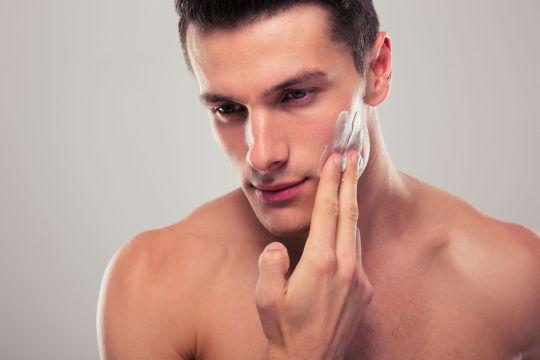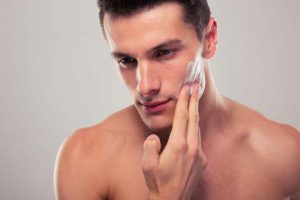
Men’s Skin Health Is Important
Men’s Skin Health Is Important
If you don’t know how to get started, don’t be afraid to ask for advice. Also, rely on a dermatologist for information on what is best for your skin. During the summer months, using the correct cleanser, alcohol-free toner, moisturizer with SPF and a weekly mask will help your skin look exceptionally healthy.
Although there are key differences between men’s and women’s skin — for example, men’s skin is thicker than women’s — the basic elements of an effective skin care plan remain the same.

At first, it’s important that everyone, including men, identify and understand their skin type:
- Sensitive skin may sting or burn after product use
- Normal skin is clear and not sensitive
- Dry skin is flaky, itchy, or rough
- Oily skin is shiny and greasy
- Combination skin is dry in some areas and oily in others
Most of the problems with men’s skin belong to facial hair. It can start with what they use to shave and how they take care of their skin after. Instead of using a bar of soap, use a product that is smoother and less abrasive. Bar soaps are tough on your skin because they can sometimes contain perfumes and harsh detergents that may strip the natural oils that are needed to keep your skin balanced.
To help men’s to get a healthy skincare routine, dermatologists recommend these tips:
Consider ingredients and product labels
The skincare products you choose will depend on your skin type. If you have acne-prone skin, look for cleansers and moisturizers that say “oil-free” or “non-comedogenic,” as these won’t clog your pores. If you have sensitive skin, use mild, “fragrance-free” products, as products containing fragrances can leave skin feeling irritated and dry. However, beware of products labeled “unscented,” as many of these contain masking fragrances that can still irritate your skin.
Look for products that contain invigorating ingredients.
Use invigorating ingredients like citrus, orange, and grapefruit oil. After shaving, use a product that is alcohol-free. There are many great toners in the market that are alcohol-free and come in a mist form for easy use. They help prepare hydration without irritation after shaving. Because regular bar soap often contains harsh ingredients that can be drying to the skin, wash your face with a mild facial cleanser.
Watch your shaving procedure.
For some men, multi-blade razors can work too well or shave too closely to your skin. If you often experience razor bumps, razor burns, or ingrown hairs, use a single- or double-blade razor instead and do not stretch your skin taut while shaving. Before you shave, wet your skin and hair to soften it. Use moisturizing shaving cream and shave in the direction of hair growth. Rinse after each swipe of the razor, and change your blade after five to seven shaves to minimize irritation.
Moisturize daily.
Moisturizer works by trapping water in your skin, which can help reduce the appearance of fine lines and make your skin look brighter and younger. For the best results, apply moisturizer to your face and body immediately after bathing, showering, or shaving while the skin is still damp.
Men’s Skin Health Is Important
Check your skin with regularity.
New spots or moles that itch, bleed or change color are often early warning signs of skin cancer. If you notice any suspicious spots, make an appointment to see a dermatologist. Men over age 50 have a higher risk of developing melanoma, the deadliest form of skin cancer, than the general population. However, when caught early, skin cancer is highly treatable.
Daily SPF will provide UVA/UVB protection.
To help avoid sun damage that can lead to age spots, wrinkles, and even skin cancer, before going outdoors, apply sunscreen to all exposed areas of skin, including your neck, scalp, lips, and ears. For best security, use a broad-spectrum, water-resistant sunscreen with an SPF of 30 or higher and reapply every two hours or immediately after swimming or sweating.
You can also preserve your skin by wearing sun-protective clothing, such as a lightweight and long-sleeved shirt, sunglasses with UV protection, pants, a wide-brimmed hat, and seeking shade when possible. For more effective sun protection, select clothing with an ultraviolet protection factor (UPF) label.
Your skin is the first thing people notice about you, and you only have one opportunity to make a first impression.







